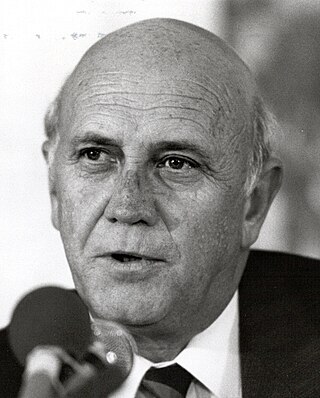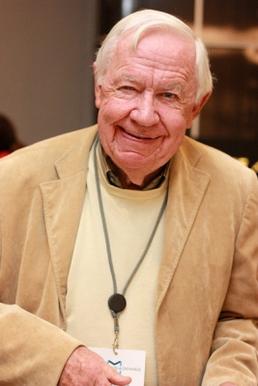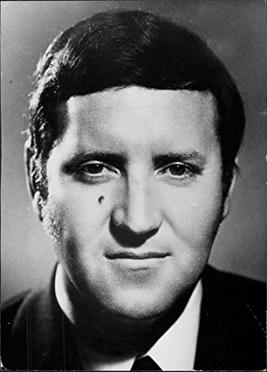
Frederik Willem de Klerk was a South African politician who served as state president of South Africa from 1989 to 1994 and as deputy president from 1994 to 1996. As South Africa's last head of state from the era of white-minority rule, he and his government dismantled the apartheid system and introduced universal suffrage. Ideologically a social conservative and an economic liberal, he led the National Party (NP) from 1989 to 1997.
The Republic of South Africa is a unitary parliamentary democratic republic. The President of South Africa serves both as head of state and as head of government. The President is elected by the National Assembly and must retain the confidence of the Assembly in order to remain in office. South Africans also elect provincial legislatures which govern each of the country's nine provinces.

Pieter Willem Botha, was a South African politician. He served as the last prime minister of South Africa from 1978 to 1984 and the first executive state president of South Africa from 1984 to 1989.
The Cabinet of South Africa is the most senior level of the executive branch of the Government of South Africa. It is made up of the president, the deputy president, and the ministers.
The following lists events that happened during 1989 in South Africa.
The Muldergate scandal, also known as the Information Scandal or Infogate, was a South African political scandal involving a secret propaganda campaign conducted by the apartheid Department of Information. It centred on revelations about the department's use of a multi-million rand secret slush fund, channelled from the defence budget, to fund an ambitious series of projects in publishing, media relations, public relations, lobbying, and diplomacy. Most ambitiously, the fund was used to establish a new pro-government newspaper, the Citizen, and in attempts to purchase both the Rand Daily Mail and the Washington Star. The projects, involving a total amount of at least $72 million, aimed primarily to counter negative perceptions of the South African government in foreign countries, especially in the West.

Iain Dale is a British broadcaster, author and political commentator, and a former publisher and book retailer. He has been a blogger since 2002. He was the publisher of the Total Politics magazine between 2008 and 2012, and the managing director of Biteback Publishing until May 2018. Since September 2010, he has hosted a regular discussion show on the radio station LBC. He was named Radio Presenter of the Year at the Arqiva Commercial Radio Awards in both 2013 and 2016.
On 13 September 1989, 30 000 Capetonians from a diverse cross-section of the city marched in support of peace and the end of apartheid. The event, led by Mayor Gordon Oliver, Archbishop Tutu, Rev Frank Chikane, Moulana Farid Esack, Allan Boesak, and other religious leaders, was held in defiance of the State of Emergency. The march resulted in concessions from the apartheid cabinet headed by FW de Klerk, following years of violent clashes between anti-apartheid protestors and the police, and was the first such event to include elected world government functionaries. It was considered the "last illegal march" at the time, and went ahead without a major confrontation. The size of the protest, despite the open defiance, and the restrained response from the police signalled the beginning of the transition to democracy.

The apartheid system in South Africa was ended through a series of bilateral and multi-party negotiations between 1990 and 1993. The negotiations culminated in the passage of a new interim Constitution in 1993, a precursor to the Constitution of 1996; and in South Africa's first non-racial elections in 1994, won by the African National Congress (ANC) liberation movement.
Lukas Daniel Barnard, known as Niël Barnard, is a former head of South Africa's National Intelligence Service and was notable for his behind-the-scenes role in preparing former president Nelson Mandela and former South African presidents P.W. Botha and F. W. de Klerk for Mandela's eventual and, as he saw it, inevitable, release from prison and rise to political power.

Allister Haddon Sparks was a South African writer, journalist, and political commentator. He was the editor of The Rand Daily Mail when it broke Muldergate, the story of how the apartheid government secretly funded information projects.
Robin William Renwick, Baron Renwick of Clifton, is a former diplomat and a former member of the House of Lords. He was appointed by Prime Minister Blair but moved to the crossbenches in 2007. He retired from the House in 2018.
The State Security Council (SSC) was formed in South Africa in 1972 to advise the government on the country's national policy and strategy concerning security, its implementation and determining security priorities. Its role changed through the prime ministerships of John Vorster and PW Botha, being little used during the former's and during the latter's, controlling all aspects of South African public's lives by becoming the Cabinet. During those years he would implement a Total National Strategy, Total Counter-revolutionary Strategy and finally in the mid-eighties, established the National Security Management System (NSMS). After FW de Klerk's rise to the role of State President, the Cabinet would eventually regain control of the management of the country. After the 1994 elections a committee called National Intelligence Co-ordinating Committee was formed to advise the South African president on security and intelligence as well as its implementation.
The National Intelligence Service (NIS) was an intelligence agency of the Republic of South Africa that replaced the older Bureau of State Security (BOSS) in 1980. Associated with the Apartheid era in South Africa, it was replaced on 1 January 1995 by the South African Secret Service and the National Intelligence Agency with the passage of the Intelligence Act (1994).
Jan Christiaan "Chris" Heunis, DMS was a South African Afrikaner lawyer, politician, member of the National Party and cabinet minister in the governments of John Vorster and P. W. Botha.
Barend Jacobus du Plessis is a South African retired politician and a former member of the now-dissolved National Party, as well as Minister of Finance in 1984–1992.
Anna Elizabeth Botha was the First Lady of South Africa, as the wife of State President Pieter Willem Botha, from 1984 to 1989. From 1978 to 1984 Botha served as Prime Minister of South Africa.
Sir Patrick Fairweather is a British retired diplomat. He served as Ambassador to Angola from 1985 to 1987 and Ambassador to Italy and concurrently Albania from 1992 to 1996. He was director of the Butrint Foundation which was concerned with the archaeology and conservation of the classical site of Butrint in southern Albania from 1997 until 2004.

When Pieter Willem Botha first became Prime Minister of South Africa in 1978, he appointed members of the National Party to positions in his first cabinet.

Rowan Cronjé was a Rhodesian politician who served in the cabinet under prime ministers Ian Smith and Abel Muzorewa, and was later a Zimbabwean MP. He emigrated to South Africa in 1985 and served in the government of Bophuthatswana.






